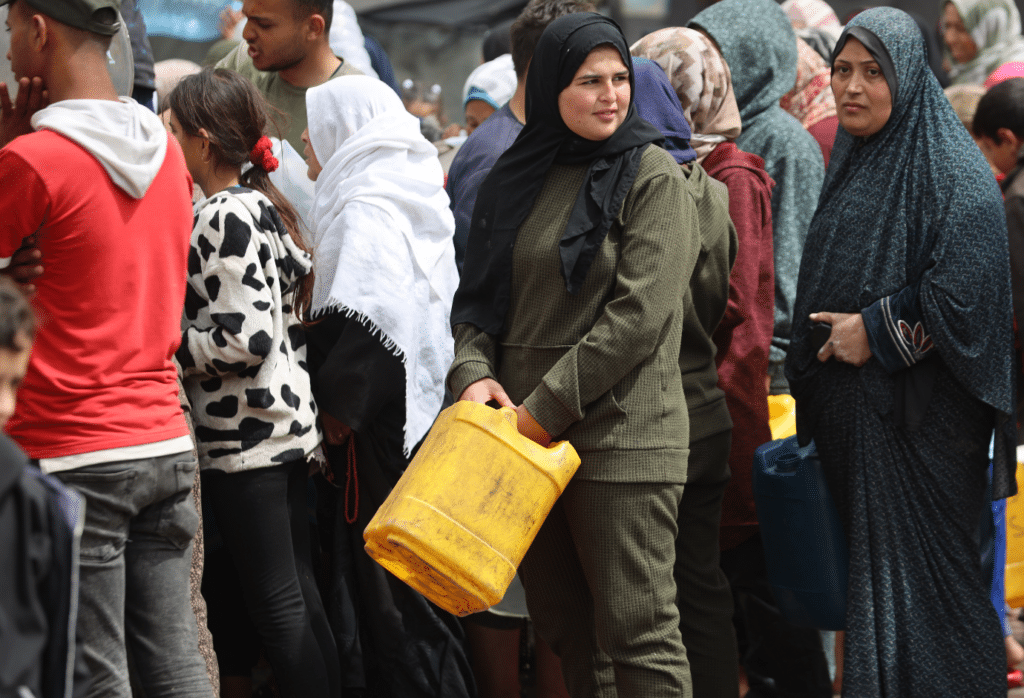As details emerge of the Israeli military’s offensive in Rafah, one charity organisation has spoken to a young mother who has revealed the devastating realities of her life in Gaza since giving birth to her second child last September.
Writing from Rafah, the 27-year old woman, who agreed to tell her story anonymously to CARE Australia, said less than a month after giving birth, she was forced to flee her home in northern Gaza “under a threat and warning message to immediately evacuate”.
“I left with the clothes I was wearing that morning, holding my daughter’s hand and carrying my then three-week-old son in my arms,” she explained.
She described the process of providing for her children as a daily struggle.
“As a mother, it is my responsibility to provide for my children’s daily and basic needs, but right now, since the start of the war, these essentials are not available,” she said. “I feel helpless. I don’t have diapers for my four-month-old baby, and I cannot wash his clothes.”
She is unable to access food or clean water for herself, or her family, as disease and epidemics continue to spread. She is currently sharing a small house in Rafah with 25 other people, where many are “sick with diarrhoea, are coughing, and have a cold.”
Women’s hygiene has also been curtailed, with women unable to access sanitary supplies and forced to queue for hours to access bathrooms.
“[Many of us are] are feeling unwell and unable to dispose of tissues soaked in blood, as they do not have any hygiene pads,” she wrote.
“It feels like the world has forgotten about the women and children of Gaza. In the past four months, some of my friends had their babies without anaesthesia, even when having caesareans, and others had to give birth in shelters on dirty, cold floors, only aided by their mothers or other elderly women.”
Hiba Tibi, CARE Country Director for West Bank and Gaza said children and mothers continue to die from diseases that are absolutely preventable and treatable.”
“The lack of clean water and sanitation facilities in makeshift, overcrowded shelters, in addition to a lack of food, sleep, and water, create fertile ground for the rapid spreading of diseases,” she said.
More than 34,000 Palestinians have now been killed in Gaza, and the United Nations World Food Program has described northern Gaza as a region now suffering from a “full-blown famine.”
Basic sanitation has broken down, exacerbating the health risks to the lives of those already most vulnerable, including children, women and mothers.
More than 1.7 million Palestinians have been displaced and have no access to safe water. At the time of writing, more than three quarters of the Gaza Strip is under evacuation orders. According to CARE, which is providing humanitarian support to the region, an average of 160 people share one toilet and 700 people one shower facility.
CARE Australia supporter and presenter Madeleine Morris said the lack of access to clean water is especially concerning.
“Clean water is so essential for mothers and newborn babies,” she said. “It’s impossible to comprehend feeding, bathing and washing a newborn, as well as yourself on a fraction of the water we are fortunate to have access to every day in Australia.”
According to the UN, over one million mothers and newborn babies around the world die from infections soon after birth each year.
This week, CARE Australia launched a new campaign to raise awareness of the extraordinary circumstances facing mothers in Gaza.
The “Safe Water = Safe Lives” appeal is seeking donations to help provide more women and girls access to clean, safe water and sanitation in the region.
“Every mother and every baby should have access to safe drinking water, no matter where they live,” Madeleine Morris said.
The donations will go to providing women with hygiene kits, water testing kits and clean potable water in the aftermath of emergencies. It will also assist in the installation of wells, water tanks and taps in communities that require them.
This week, UN aid agencies released a statement expressing concerns about the two main access points into Gaza which remain closed, warning that families are scared and “hanging on psychologically and physically by a thread.”
“Any escalation of hostilities resulting from a full-scale incursion into Rafah will push residents and displaced people currently living there past their breaking point,” the United Nations Office for the Coordination of Humanitarian Affairs (OCHA) wrote.


